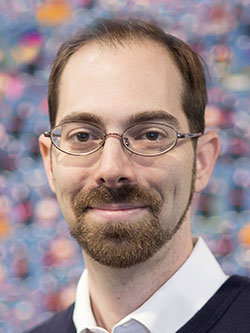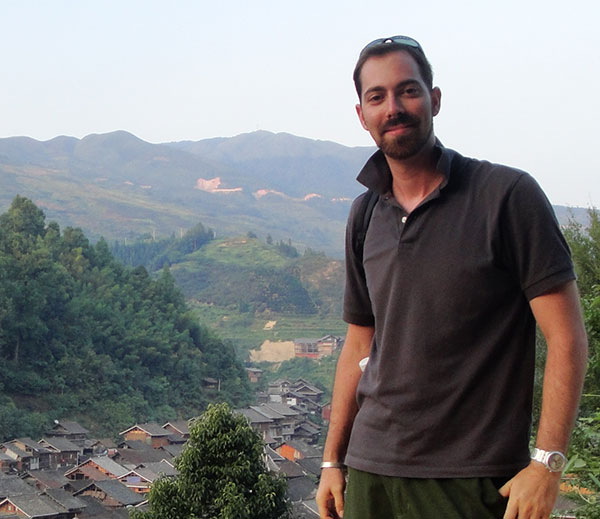
Dr. William Nitzky
Certificate in Museum Studies Coordinator, VLSM Co-Director
- Email: wnitzky@csuchico.edu
- Phone: 530-898-4953
- Location: BUTE 217

Education:
Ph.D. Arizona State University 2014
M.A. University of Hawaiʻi, Manoa 2004
B.A. The George Washington University 2001
Research Interests
My research spans the sub-disciplines of Socio-Cultural Anthropology and Museum Studies. Within Socio-Cultural Anthropology, I focus on identity politics, ethnic relations, and rural development among ethnic minorities of China. Since 2000, I have conducted fieldwork in China examining state-minority relations, ethnohistory, ethnic minority religious practices, and the politics of cultural representation and poverty alleviation through the tourism industry in the regions of Yunnan, Guizhou, and Guangxi, southwest China. My recent research turns to the implications of the recent nationwide heritage protection campaign for local ethnic minority communities, claims to heritage (both tangible and intangible), and power relations between different stakeholders. Through my fieldwork with Yao and Miao ethnic groups in Guangxi and Yunnan, in particular, I have begun to map the historical trajectory of bronze drum heritage across the region and the transformation in function and meaning of the drum in everyday life.
I am also conducting research on the wave of Chinese international tourists. My research explores the mobility of Chinese outbound tourists, their motivations and behavior, and the increasingly prevalent socio-cultural impacts of the largest spenders in the world. Past fieldwork was conducted in Japan, a hotbed for Chinese tourists, and how this new tourist market has begun to transform Japan’s tourism industry.
As a Museum Studies scholar, I focus on both museums as “social agents” for change and innovative and alternative museum practices. My research analyzes how the Western new museological concept of the ecomuseum is being adapted in China. Through the use of both qualitative and quantitative ethnographic methods, I have investigated the similarities and differences in the outcomes of ecomuseum development across different ethnic minority and Han Chinese village sites. My applied museum work has concentrated on social inclusion and provoking discussions on social inequality, trauma, and civil liberties in the museum space. With students from ANTH 467, I oversaw the curation of two exhibitions at the Valene L. Smith Museum of Anthropology, Hmong Reflections: Stories of Our Own (Dec. 2016-Aug.2017) and Imprisoned at Home (Jan. 2018-Aug.2018).
Courses
ANTH 200 Cultures of Asia
ANTH 303 Cultural Anthropology
ANTH 338 Culture and Tourism
ANTH 405 Museum Administration
ANTH 462 Museum Education
ANTH 467 Exhibit Research, Design and Installation
ANTH 483 Field Methods in Ethnography
ANTH 498 Special Topics
ANTH 603 Seminar in Cultural Anthropology
ANTH 605 Seminar in Museum Studies
Selected Publications And Presentations
Forthcoming. “The “Heritage-Effect” in Ethnic China: Navigating Intangible Cultural Heritage Discourses”, Special Issue in Senri Ethnological Studies, National Museum of Ethnology, Japan
2014. Reflections on the Politics of Safeguarding Living Heritage through the Ecomuseum Contact Space (对利用生态博物馆保护活态遗产这一政策的思考). Museum International (Chinese Edition). UNESCO-ICOM.
2012. Mediating Heritage Preservation and Rural Development: Ecomuseum Development in China. Urban Anthropology and Studies of Cultural Systems and World Economic Development, Special Issue, “The Chinese State, Local Communities, and Rural Economic Development”, Vol. 41: 2,3,4, pp. 367-417.
2012. Reflection and Prospects of Chinese Ecomuseums: An Interview with Su Donghai (中国生态博物馆的反思与瞻望—苏东海先生访谈). Chinese Museums 1(1). pp. 109-115.
2013. Community Empowerment at the Periphery?: Participatory Approaches to Heritage Protection in Guizhou, China. In Cultural Heritage Politics in China, Tami Blumenfield and Helaine Silverman, eds. New York: Springer. pp. 205-234.
